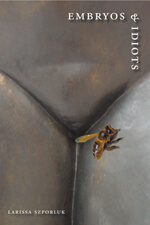 Indiana Review
Indiana Review
Summer 2008
Larissa Szporluk, Embryos & Idiots. Tupelo Press, 2008.
Review by Cate Whetzel
In borrowing a title from Milton, Larissa Szporluk’s fourth collection, Embryos & Idiots, invokes and salutes Paradise Lost and the epic tradition by offering an alternative to overly familiar and reheated Western cosmogonic myths. What a relief! Very few collections offer an escape, however brief, to a landscape as mysterious as the kingdom of Od. Embryos & Idiots is composed of three sections, or acts, that balance the sacred with a healthy dose of the profane. Each act is prefaced with a neatly diagrammed program—reminiscent of a playbill—outlining the section’s dramatic scene, the characters in relation to each other, and voices we may expect to hear in the chorus.
In the beginning is Anoton, Szporluk’s principle character. We learn that in the mineral kingdom of Od, Anoton informs on his mother because he “suspects [her] of breaking the law against harboring plants and animals. He reports her; she is demolished.” In retribution, Anoton’s father cuts off his son’s head. It lands on Earth and becomes an island. In time, Anoton, sentient despite decapitation, will indirectly demolish another woman.
The opening poem “Boulders” shows Anoton’s suspicion that his mother has a live bee “trapped in the amber / nook that led to her mineral uterus.” The lines that follow are saturated with Od-forbidden images and the buzzing of a lone bee:
He had been born with that sound,
the rain of maracas, maraud of a rose, and so lived
in his mind with a wax city, silver hives
of see-through honey, chambers crammed
with princess-waste and ice, and would be
almost crazy, brushing her outer stone,
of which he had grown enamored
like a pilot of a bomb site, fingering the lever—
This is a reminder of how the forbidden becomes erotic and may refresh and exert its power through imagination, and how language may give us our desires with one hand, but will punish us with the other.
It’s an old story but the voice is new; the metaphors are glossy. Here are jealous and impatient mothers, fathers, and children. Children are alternately victims and tyrants. Parents are tragic failures who need to he overthrown. In section two, in which “everthing starts talking,” we hear an anonymous speaker, whose situation is analogous to Anoton’s, address his mother in “Stars and Marrow”;
… I turned
my back on you and died like a duck
in the open, a pile of yesterday’s
nobody’s child. Strapped to my high
yellow chair the waves that lunged
at me were carnal, but no, I didn’t
mind. There is so much good
in the worst of us, so much bad
in the best. I found succor in the devil
when the angels cocked my head.
Anoton’s fall is reminiscent of similar scenarios m Classical Greek, Hindu and Christian mythologies: the Greek Hephaestus is cast down from Olympus by parents Zeus and Hera during a family argument, resulting in a permanent lintp; another Classical turn in Embryos & Idiots refers to Anoton as “Venus’s son,” the family incestuous, temporally crippled Eros. In Hindu mythology, Ganesh loses his head when his father Shiva fails to recognize the boy guarding Parvati’s bedroom door. In an effort to console Ganesh’s mother, Shiva replaces the boy’s head with the head of an elephant. Last in this group is the Biblical and Miltonic Satan, expelled for a definite crime attempting a militaristic coup to rule heaven in God’s place.
But whatever similarities abound, Szporluk’s Anoton has more In common with Milton’s Satan than with any “bad son” archetypal role. Both are punished for their ambitions, but the fruit of their punishments is not a lesson learned but a new path, diametrically opposed from the world both characters have known. Satan is given Earth and the space beneath it; Anoton becomes a mountain island and consumes a girl castaway, repeating w basic gesture his original sin. In section one’s final poem “Dark Eros,” the subsumed girl, or possibly the broken mother, or even the goddess Venus, speaks to Anoton-the-mountam; “How does / it feel, she asks the old mountain, / to have no choice but to feel”‘ From underwater, Anoton answers her
The past is a quasi-fetish.
I was only a child but my
obsession with you was divine.
The richness of language in this collection cannot be overstated—Szporluk loves to rake words, to break rocks, to turn the earth in each poem by breaking up the musty and the comfortable. In doing this she brings us new worlds, neat and prettily shaped on the page, but also smart, allusive and self referential. Her poems demand a careful eye. Although I admire Szporluk’s previous collections, I admit that in the past I’ve found myself feeling along a poem’s outer wall for a latch or window, having a great time but thoroughly mystified. That’s not the case here. Here many layers and motifs set up an infinite figure eight for the dedicated reader to tread and retread. The poems in Embryos & Idiots reward the intellect without sacrificing the senses.

